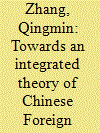|
|
|
Sort Order |
|
|
|
Items / Page
|
|
|
|
|
|
|
| Srl | Item |
| 1 |
ID:
133815


|
|
|
|
|
| Publication |
2014.
|
| Summary/Abstract |
This article tries to integrate the theories of personality type and Chinese foreign policy studies. It finds that theories of personality offer a new perspective on the study of Chinese foreign policy and help to better explain the differences in China's foreign policy under Mao Zedong and Deng Xiaoping, including their international orientation, the main themes of China's foreign policy during their respective times in office, their policies towards the major powers, as well as those towards small countries. Theoretically, such integration contributes to the development of a more general theory of foreign policy analysis that would travel better beyond the borders of the American case. Empirically it highlights the necessity and benefit of an integrated approach bringing leadership personality back into the center of the analysis while taking into account other levels of analysis in the study of Chinese foreign policy.
|
|
|
|
|
|
|
|
|
|
|
|
|
|
|
|
| 2 |
ID:
129502


|
|
|
|
|
| Publication |
2014.
|
| Summary/Abstract |
Impressive investment and growth figures and commercial write-ups enthusing about 'Africa rising up', 'the continent of the future', and so on, obscure the poverty, illiteracy, poor health and other hardships afflicting the vast majority of African people. Why has massive so-called development and technical 'aid' not created the expected dynamic, autonomous economic progress? A blind eye is delicately being turned to the decisive role of people - more specifically, the cultural element. Notwithstanding good intentions, outsiders seeking to promote development assume that black Africans think and act like they only need more education, training and finance in order to 'catch up'. Outsiders easily forget that since time immemorial, Africans have developed and cherished worldviews and cultures of their own. While these are by no means immutable and do adapt to changing needs and outside influences, Africans refuse to cast off overnight the heritage that makes them the people they are. This paper examines the impact of witchcraft as an integral feature of traditional culture on African existence, notably community life, religion, politics, the law, and economic practice. It stresses the significance of traditional society's powerful egalitarian impulses as well as its profound conviction that all things - goods, wealth, well-being and life force - are in a strictly limited supply that cannot be increased, but can only be redistributed by force or through magical manipulation. While modern life gradually weakens the influence of witchcraft beliefs - in Europe these flourished well into the 18th century - the exasperation associated with Africa's headlong urbanisation actually bolsters these beliefs.
|
|
|
|
|
|
|
|
|
|
|
|
|
|
|
|
|
|
|
|
|